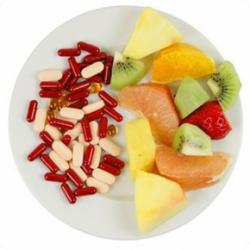This is not to say that vitamin and mineral supplements are not of value. Many people need a vitamin/mineral supplement to meet specific nutrient needs that they cannot or do not get from food. For example, people who do not eat dairy products or other rich sources of calcium need a calcium supplement, and vegetarians or other people who eat no animal foods need to take a vitamin B12 supplement. Also important, women who could become pregnant are advised to eat foods fortified with folic acid or to take a folic acid supplement in addition to consuming folate-rich foods to reduce the risk of some serious birth defects. People in northern climates or those who get little exposure to the sun, plus older adults may need a vitamin D supplement.
Physicians often prescribe vitamins or minerals for meeting nutrient needs or for therapeutic purposes. For example, doctors may advise pregnant women to take an iron supplement, and adults over age 50 to get their vitamin B12 from a supplement or from fortified foods.
In the last few years, a new player had entered the field – whole food supplements. Whole food supplements have emerged to support the shortage of fruits and vegetables we are getting in our diets. Fruit and vegetable supplements contain not only a far wider variety of naturally occurring vitamins and minerals than traditional vitamin supplements, but also the antioxidants and other phytonutrients, even the fiber, found in fresh raw fruits and vegetables. These varied nutrients work together in combination to provide you more of the nutritional benefits of eating healthful whole fruit and vegetables.
Whole food nutritional supplements contain natural fruit and vegetable juice powders in capsule form. The powders are concentrated from fruit and vegetable juices using a proprietary, low temperature process that leaves as much of the nutrition as possible intact.
The take-home message here is that nothing can quite equal the value of eating fresh fruits and vegetables every day, but when that’s not possible, multivitamin/mineral supplements and the new whole food supplements can certainly help you maintain your good health and vitality.
Fruits & Vegetables vs. Supplements

Then nutrition studies came along and we began learning how important vitamins, minerals and other nutrients are to good health. Through studying disease conditions, results showed that perhaps most people didn’t get what they needed from their food choices and became deficient which led to illness. This is when researchers found out how important it is to eat a variety of fruits, vegetables, whole grains and high-quality protein sources to maintain physical, mental and emotional health.
Then came the studies on individual vitamins, minerals and other nutrients. Researchers discovered that each one provided particular benefits and so vitamin/mineral supplements and herbal botanicals became popular as an adjunct to your diet, especially if you didn’t eat the right foods. After years of focusing on single nutrients, nutrition researchers began to focus on whole foods, finding that food is more than just a sum of its nutrient parts. So, instead of taking a handful of vitamins each day, the advice that came down the scientific pipeline was "Eating a variety of fresh fruits and vegetables every day has superior health benefits because of the ‘synergy’ of food." This means that all of the compounds in a piece of fruit or a vegetable work better together in your body to perform different jobs than taking the same individual vitamins.

- Login to post comments
Testing Your Biological (Body's) Real Age
The Biological Age Test can help you find out in moments what your biological age is and how your age is changing. For some, this might mean they are aging too rapidly. For others, good habits may show that their biological age is moving downward, making them healthier and more youthful. It’s never too late to make changes in your life either. No matter what the results, being able to track one’s biological age will help you find out whether you are heading in the right direction for health or if you need to turn around and ask for more directions.
The Health Snapshot Program for Health Monitoring
The Health Snapshot program helps you look into the state of your health every day. As you check in with your health levels each day, you will begin to see that your health is changing daily. This will allow you to make health decisions based on the findings. And in many cases, you can do things to make yourself feel better, based on the seven levels of readings you see on the computer screen. Scientifically valid and quick, the Health Snapshot program makes sense for those who don’t want to spend all of their time or money at the doctor’s office. Be careful though, like any other program it’s not a doctor replacement and not a treatment for any medical need.
Personal health monitor. Tracks daily health changes and alerts on possible health issues (including cancer) on its early stage. Designed for health cautious individuals, wellness centers, health clubs.
Biological Age Test. Personal tool to evaluate and monitor biological age. Designed for health cautious individuals, wellness centers, health clubs.

